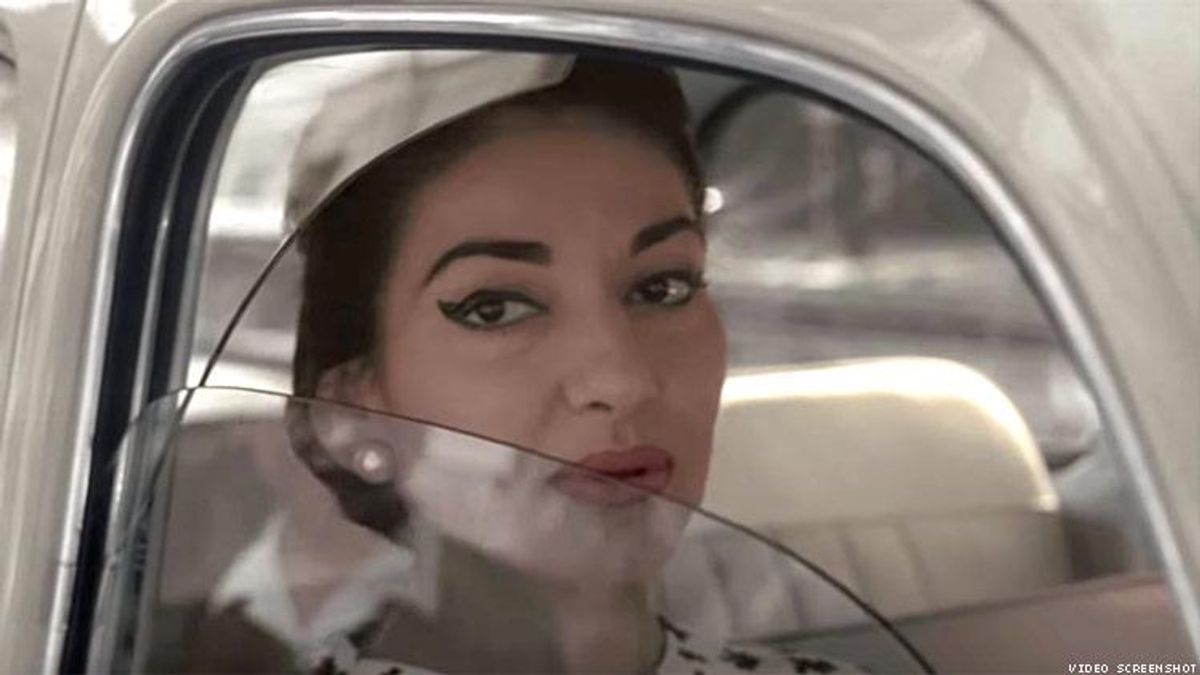Entertainment
REVIEW: New Doc “Maria By Callas” Is High-Grade Dope for Diva Junkies

Maria is for everyone, and this film is a dynamic introduction.
November 05 2018 6:24 PM EST
May 26 2023 3:27 PM EST
By continuing to use our site, you agree to our Private Policy and Terms of Use.

Maria is for everyone, and this film is a dynamic introduction.
For sheer star power, "Maria by Callas" may be hard to beat this year. The documentary, in release from Sony Pictures Classics, joins 2018's string of high-profile biographical docs ("RBG," "Won't You Be My Neighbor") and may match their surprise box office potential. Directed by Tom Volf, "Maria" is compiled from breathtaking archival footage, television interviews, and letters, which reveal La Divina, the diva of all divas and in her time one of the most famous women in the world, in all her contradictions and splendor.
Like the recent documentary "Amy," which searched home movies and concert footage to understand the tragic death of Amy Winehouse, "Maria by Callas" is on a hunt for clues, but Volf mostly wants to remind us what real talent is. Of course, I should qualify all of this. I revere Callas: She was my way into opera, which has become one of my life's great pleasures, and I am therefore the ideal audience for the film. Still, I think Maria is for everyone, and this film is a dynamic introduction.
It goes without saying that Maria Callas was a great star, a magnificent beauty who commanded both the ear and the eye, and this footage positively shimmers with glamour and pathos. Substantial digging results in sublime footage, long unseen and restored to vivid life. We follow Callas into her dressing room and to the beach. Amateur 8mm film, shot from the balconies of the world's great opera houses, is synched up with bootleg audio. The religious experience of a live Callas performance is lost to time, but it is memorialized here. In delicious newsreel footage, three young gay men, shivering to death on the standing room line for her legendary final Met Toscas, offer her veneration: "Only for her would I do this." "There is no word to describe her." "To miss her would be a crime."
Professional footage of Callas performances are understandably rare, given the nature of her art form, but Volk includes full-length arias from concert performances: "Casta diva," from her favorite role, Bellini's "Norma;" "L'amour est..." from Bizet's "Carmen," which she never performed in a staged production; and of course, "Vissi d'arte" from Puccini's "Tosca." Most opera fans know and treasure this footage already, but for the uninitiated, they may prove transformative. It is often posited that Callas could have easily transitioned to film stardom, and Callas did make one film, Pasolini's uneven "Medea." But even in these brief excerpts, her expression is poetry in raw motion.
Still one of the best-selling classical artists in the world, Callas carefully cultivated her particular aura of sacrifice and mystery that has sustained her audience's continued cultish devotion. And yet, if you were to listen closely to her interviews, she shrugs off that mantle with every breath. Again and again, she dismisses her glory, and says she would be glad to give up singing if the right man came along. She walks a fine line, and she is thoughtful and blunt about it, especially in an eloquent David Frost interview: "I would like to be Maria. But there is the Callas, which I
have to live up to." Though she remains unmatched in the mesosphere of great prima donnas and has never been surpassed in terms of international celebrity, Callas always brings the attention back to the toil and the discipline, the perpetual dissatisfaction and loneliness.
Interestingly, Volf steers clear of major components of the Callas image. We scarcely notice the famous weight loss and transformation that accompanied her rise to international fame. Her first marriage to industrialist Giovanni Battista Meneghini, a svengali type who managed her career throughout its prime, is alluded to but never of major interest. And, perhaps most importantly, it abstains entirely from the decades-long tabloid feud that pitted Callas against another reining diva, Renata Tebaldi. Though intriguing, the gossip that dogged Callas during her life are less interesting than the frustrations of an artist who knew her worth, held high standards for herself and her collaborators, and who was let down by the men around her and sustained by her audience. And that is an audience this film is likely to both expand and enthrall.
Sexy MAGA: Viral post saying Republicans 'have two daddies now' gets a rise from the right